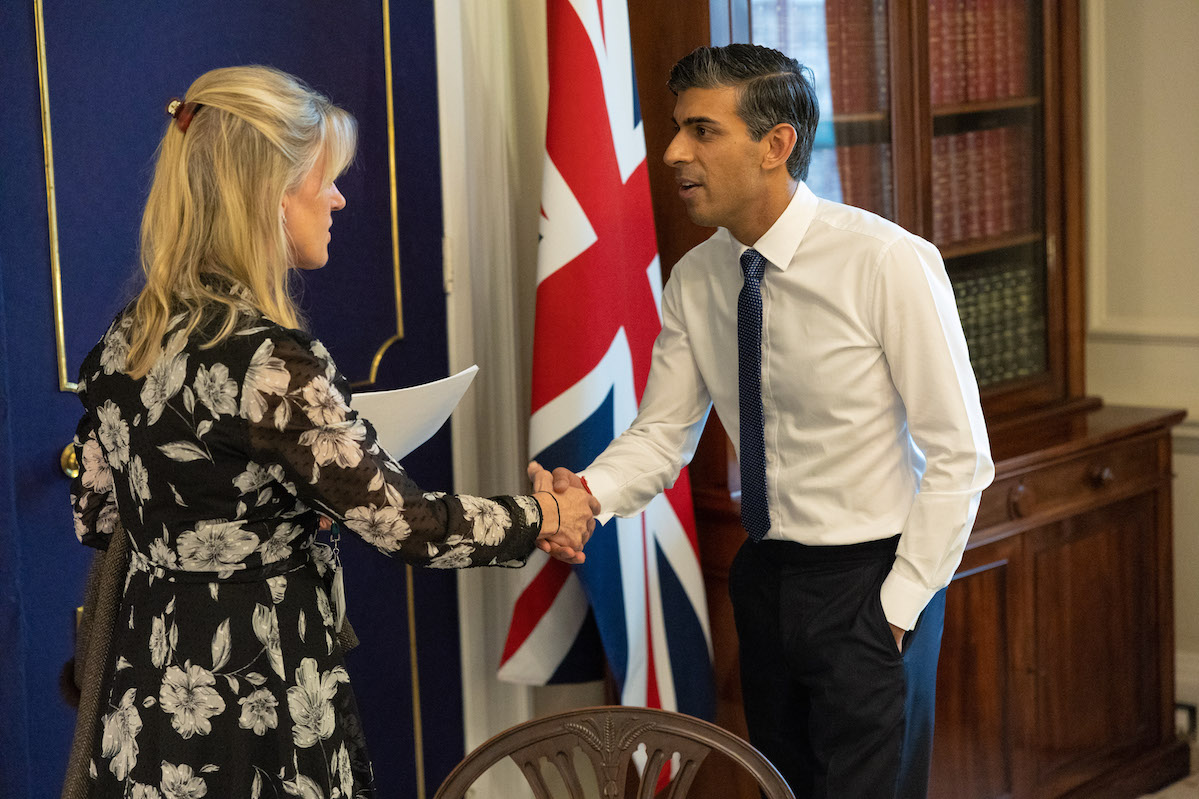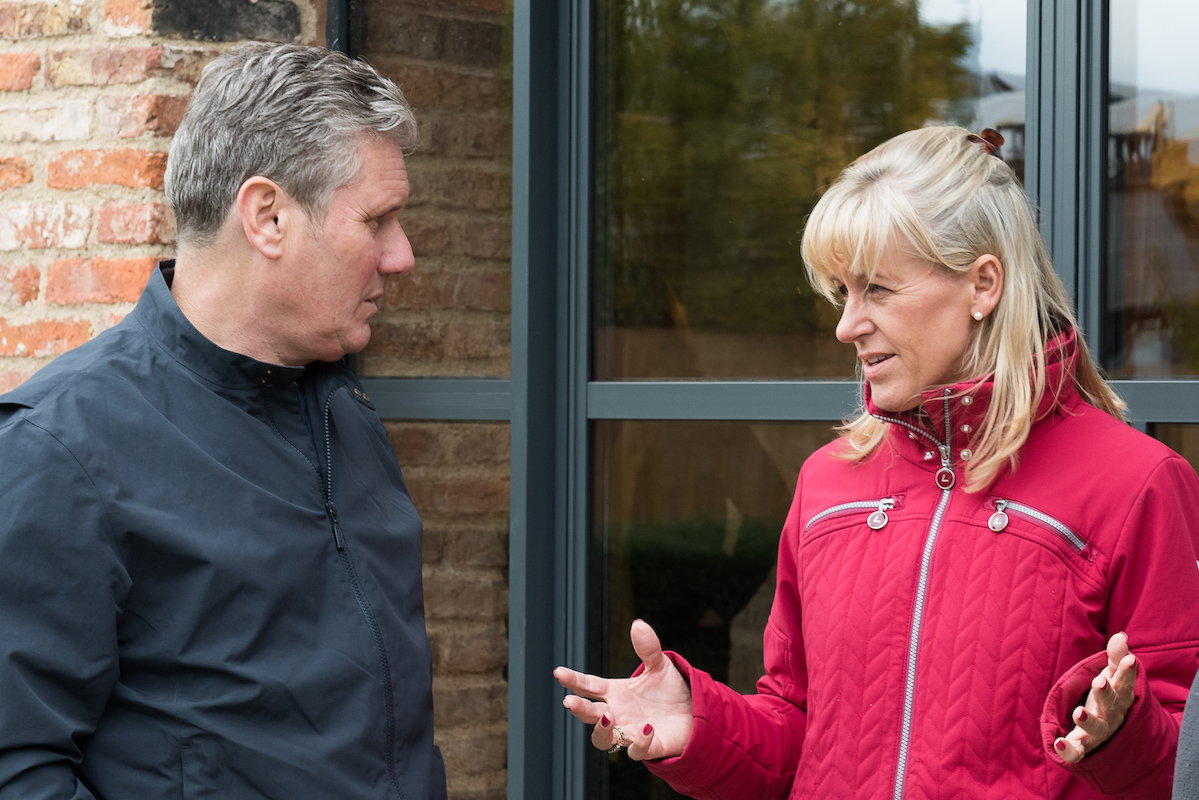The Minette Batters interview: 'I’m fed up with agriculture being deemed low-skilled, low-paid'
(Copyright: Lawrence Looi, NFU)
9 min read
Brexit thrust farmers into the centre of political debate for the first time in generations. Minette Batters tells Tali Fraser what it’s been like to be in the eye of the ‘tornado’
Minette Batters – once dubbed ‘queen of the countryside’ – has stepped down as president of the National Farmers’ Union (NFU) after six years of a more-or-less adversarial relationship with government.
The marathon-running tenant farmer has been a robust defender of the sector as it struggles to cope with the fallout from Brexit, Covid-19, volatile input costs, and climate change.
She has seen six different ministers at the helm of the Department of Environment, Food and Rural Affairs (Defra) come and go – one for each year of her tenure. She intimates that at times and in private the language got, well, a little agricultural.
“I remember doing an interview with The Times when Thérèse Coffey was Secretary of State at Defra and I don’t think my comments landed really that well.” Batters, 57, had branded Coffey – her fifth Defra secretary – as “asleep at the wheel”. Relations were to get still worse with the arrival of the sixth, Ranil Jayawardena, the man picked by Liz Truss, who Batters says swept through the department like a “tornado” in a 49-day stint as memorable as it was short.
She discloses that the NFU “were used” by Truss and her senior advisers in a bid to replace the environment and land management scheme (Elms), in which landowners are paid for providing “public goods” like environmental protections, reverting to the basic payment scheme, paying landowners for simply managing their land.
She describes how one senior advisor had “bowled” into Defra and told staff: ‘We think the easiest thing to do is to say that the NFU wants to return to basic payments, and we’re going to shred up the Elms scheme’. So I had one extraordinary weekend when I had Richard Benyon [then a Defra minister] on the phone, the permanent secretary Tamara Finkelstein on the phone – and I had say to them: ‘I don’t have a clue what you’re talking about’. We have never called for a return to basic payments… The government had just gone, ‘Oh, we’re gonna end it and we’re going to blame the NFU for calling for it.’
When the story then broke in The Guardian, she says it became clear that Number 10 “had proposed that without any mention to me at all. We were just used.”
When Batters explained the situation, both Benyon and Finklestein “were shocked”. NFU members “were going berserk” – and all over “something that was total fiction”.
The former NFU president adds: “It was a mad time. It was just like, ‘we’re going to break everything and reposition it’ in the same way that Truss did with the economy.”
I see a lot of pushback from civil servants... They want Defra to be the environmental regulator, full stop
There appears to have been a realisation among those in government that it is better to have the NFU president onside. Plain-speaking, across her brief and, she insists, thoroughly apolitical (as is the NFU), Batters wants anyone and everyone in Westminster to listen to NFU members’ pleas for food production targets, a comprehensive seasonal worker scheme, and impact assessments on trade deals.
“At the end of the day, my job has been to make sure that what my members are concerned about is heard and put across in a reasoned way... It’s not my job to acquiesce to the government line,” she says.
“Some people get upset by that and ask: ‘Can’t you be more optimistic?’ Well, it’s not about being optimistic. It’s about being realistic as to what is happening.”
What is happening, Batters says, is a succession of governments with “a, dare I say it, schizophrenic way of working”. The NFU was established in 1908 to restore the relationship between farmers and government after the longest period of depression in British farming’s history, but that aim has recently proved difficult to uphold.
She credits Sunak with at least taking a different approach to trade than Truss and Johnson, highlighting that he walked away from the Canadian deal after pushing the UK to relax the ban on hormone-treated beef, but there are still issues.
“In conversations I’ve had with the Prime Minister about the trans-Pacific deal, CPTPP, he said: ‘I really want you to praise this deal.’ And I said: ‘Well, I can’t praise it, because you’ve liberalised with two of the major agricultural economies, but I can say that you have taken a very different approach’,” which – from Batters – appears to be a compliment.
 Minette Batters and Prime Minister Rishi Sunak (Copyright: No.10 Downing Street)
Minette Batters and Prime Minister Rishi Sunak (Copyright: No.10 Downing Street)
What she would like to see is the follow through of what Sunak promised during his campaign trail last August on setting a target for food production, with annual reporting, that would “reset the agenda” and see environmental targets delivered “without displacing our food production”. So far there has been no movement, although Batters doesn’t think the fault entirely lies with politicians.
“I see a lot of push-back from civil servants not wanting to do it. They want Defra to be the environmental regulator, full stop.”
Government scientists have been tricky, too, with chief scientific advisor Dame Angela McLean invited to the NFU’s recent conference – but “she was too busy with the Covid inquiry”.
Batters adds: “It isn’t just about politicians. It’s about government scientists, civil servants, and government lawyers, dare I say, as well.
“The danger is that after an election, if we do get a Labour government, they unlock the door into Defra and we carry on exactly the same as before so it’s really a message to all parties that we need to change and the Civil Service needs to change as well.”
The former NFU president says Labour has not provided a thorough enough opposition to some of the government’s agricultural policies – but her “current concern” with the party “is that they don’t have a solid position on food production”.
 Labour leader Keir Starmer and Minette Batters (Copyright: Kate Mallender)
Labour leader Keir Starmer and Minette Batters (Copyright: Kate Mallender)
The lack of clarity, from all parties, on the plan for agriculture is helping fuel a growing mental health crisis in farming.
“Mental health is a massive, massive issue. I think a lot of that is because we haven’t had a plan. Farmers do not know what the road ahead holds for them,” Batters says.
“They don’t know what the government’s ambition is. Not only do they not know what the government ambition is, they don’t know what Labour’s ambition is, or the Liberal Democrats, and that uncertainty is causing a lot of concern and is impacting on mental health and wellbeing.”
Batters herself is a tenant farmer – the sixth generation of her family in the industry – on 300 acres in Salisbury, farming beef, sheep and arable since 1998. It has kept her closely aware of the challenges that NFU members face.
For the first time in 13 years of asking, the NFU has found members’ confidence is low in both the short and mid-term: “That’s why farmers desperately need to know what is planned for food production.”
A shift is needed in Whitehall to prioritise this – and even the phrasing used at Defra appears to forget food, Batters claims.
“Steve Barclay is always referred to as the secretary of state for the environment now and the rest of the acronym is dropped. Why can’t we actually say the secretary of state for food and environment because that is what they are?”
It was a mad time. It was just like, ‘we’re going to break everything and reposition it’ in the same way that Truss did with the economy
Around this time last year, the UK faced rationing of salads because of weather in Morocco; shortages of eggs because the cost of production wasn’t being met by retailers; and the country is growing fewer tomatoes than at any time since records began in 1985.
“We do not have any food resilience,” Batters says plainly.
“If I compare us to the US, you look at the size of the US farm bill and that is totally focused on keeping food affordable, ironing out risk and volatility, weather events. We don’t have any crop insurance here in the UK. We’re seeing farmers and growers carrying all the cost and, in many cases, using working capital to keep those businesses going. That is unsustainable.”
She adds: “That’s probably been the hardest message to land with government: How are we going to ensure that farmers can manage risk? England – during the transition that it is in now – is the only country in the G20 whereby we are downsizing our financial investment in food production.”
For the first time, farmers sit second to nurses as an occupation that is valued by society, according to NFU polling – and Batters believes it should serve as impetus to encourage new workers into the industry.
“I find it extraordinary that we are not incentivising school leavers,” she says. The former NFU president would like to see a comprehensive food strategy across government that would then be part of the national curriculum to help highlight farming roles.
Batters adds: “There are opportunities for people when they leave school, picking our fruit and vegetables, outside, earning money… Instead of focusing on maths, focus on vocational skills that actually connect people with nature and with food.”
It would be a productive way of dealing with staff shortages, which she claims are the cause for millions of pounds of crops going to waste. There are also too few dairy herdsmen and women – which are “extremely well-paid jobs”, Batters says – so much so the NFU have been pushing for them to be added to the government’s shortage occupation list.
The language used by politicians around farming jobs has “not helped”, she adds: “These are highly skilled, highly mechanised jobs.
“Even seasonal workers, I’ve challenged many politicians not to call it low-skilled, low-paid because we pay above the national living wage for our seasonal workers and it’s phenomenally skilled work, you’re often selecting, cutting – the productivity rates, I would defy any politician to keep up with it.”
Upon her departure from the NFU, Batters is not tempted by a career in politics and rules out becoming an MP.
“My values are very much in apolitical working. I want to be able to influence but I wouldn’t join a party,” she says.
What if the offer of a crossbench peerage ever came calling? “I’d be really up for looking at ways that I can influence. I don’t know about that, but ways that I can influence don’t involve taking a party whip.”
